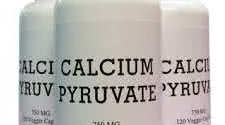Pyruvate Supplement for Weight Loss - Ultimate Fat Burner

Shed that stubborn body fat with the power of supplementation
HOW EFFECTIVE IS PYRUVATE?
Pyruvate is made from glucose in the glycolytic pathway. The glycolytic pathway is a process where glucose is broken down in successive enzymatic steps to produce pyruvate. You can think of it as half a glucose molecule. (Glucose is made of six carbons and pyruvate is made of three carbons.) Pyruvate occurs at a particularly interesting place in the chain of metabolites that give us energy. It can then be broken down by the pyruvate dehydrogenase complex and enter the TCA cycle as acetyl-CoA to give us ATP for energy. Pyruvate can also be converted into lactate and recycled back into glucose, depending on the metabolic status of the person at any given moment. Anyway, that is a very simplified overview of where pyruvate comes from.Studies of pyruvate have looked fairly promising. Most of the research has been done on overweight people on a low-calorie diet with pyruvate supplying a large percentage of their calories. Intakes of 16-30 grams a day an the form of sodium and/or calcium pyruvate) for the weight-loss effect have been used in the research with humans. Scientists found that the subjects who ate a low-calorie diet with the pyruvate lost more fat (48 percent more) and more weight (37 percent more) than those eating a low- calorie diet without the pyruvate. People using the pyruvate in the research also sustained a slightly higher resting metabolic rate (RMR) than the people not getting the pyruvate. The exact reason for this effect is unknown. In his Dirty Dieting newsletter Dan Duchaine recently discussed research that shows the conversion of T4 to T3 (the less active form of thyroid hormone converted into the more active form) is dependent on the ATP status of the liver On a low-calorie diet the liver becomes depleted of ATP and the conversion of T4 to T3 is greatly reduced. Thus a person's metabolism slows down on the reduced-calorie diet and weight loss comes to a big fat halt.
What does this have to do with pyruvate? The substance has been found to replenish liver ATP preferentially and therefore could block the reduction in T3 that happens on the low-calorie diet. This theory might explain the greater weight loss and higher RMR seen in the research, though at this time it is all speculation. albeit very good speculation.
Another theory on pyruvate is that it creates something of a futile energy cycle within the cell and thus burns up some additional energy (calories), giving the person a higher RMR and better weight loss. Some research points to pyruvate as increasing endurance by as much as 20 percent, so it could also be useful to endurance athletes and possibly bodybuilders. Most of this research has been done by a Dr Stanko and colleagues.
How low a dose can a person take and still see some benefits from pyruvate? Lately there have been rumors of new research showing it might work at doses as low as 4 to 6 grams a day, but this idea is not proven yet. My hunch is that pyruvate, because of where it is found in the energy pathway, is a particularly important metabolite for the body's feedback mechanisms that tell the system f the body is in a starved or fed state. The use of pyruvate might fool the body !r feedback mechanisms into thinking we are well fed despite being on a reduced-calorie diet. For this reason I think it could be a very useful addition to a good fat-burning supplement combined with other key ingredients and might work at the lower doses. I am not totally convinced that pyruvate by itself would do all that much for a person, especially at the lower doses. Only time and some more research will give us the definitive answer.
Finally, you should be aware that only a few companies have been licensed to sell pyruvate. Med-Pro has the exclusive rights to license out pyruvate for the purpose of weight loss from Dr Stanko. Though various companies are now selling pyruvate, my understanding is that only Prolab Nutrition, Body-Onics and New Vision are actually licensed to sell it for its intended use of weight loss. From what I hear through the grapevine, a number of lawsuits are pending against some of the companies selling pyruvate without a license from Med-Pro Industries. If you decide to try pyruvate, you might want to consider sticking to the licensed companies as another company you get it from might not be selling it in the near future - or they might not have any pyruvate in the bottle at all!